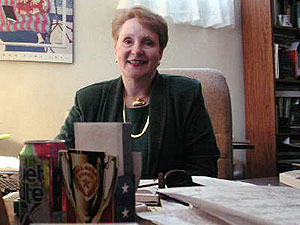|
Audio
Photos
Resources
Your Voice
|
Coach for life
March 3, 2003
We all make promises to ourselves. 'I'm going to lose some weight.' Or, 'I'm going to spend more time with the kids.' Or, 'I'm going to learn to play the piano.' Some people put sticky notes on the fridge to remind them of their pledges. Some people use their palm pilots. And some people hire a "life coach."
Duluth, Minn. — You might find them in the Yellow Pages, and you can certainly find them on the Internet, at Web sites like "Coachville," and "The International Coach Federation."
The coaching profession is blossoming.
It started in the United States about 20 years ago. Now, thousands of people work as life coaches from St. Cloud, to Switzerland, to Singapore.
"A coach is a person who actually participates with another person in getting them what they want," says Melanie Keveles.
Keveles spent 20 years doing outplacement - helping people find new jobs after they were laid off. For the past five years, she's been a coach. She lives in Superior, Wisconsin, but she has clients all over the country. Like many coaches, she meets with her clients by telephone.
|
It's not common for people to have a relationship that's totally focussed on you and where you want to go.
- Susan Dettweiler, professional life coach |
"I think that the phone is a very intimate device," she says. "Sometimes you're more apt to tell people things on the phone when you don't see them face to face than you do in person."
Melanie Keveles tries to get her clients to tell her what they really want to do. Maybe they've been dreaming of a new job. Maybe they want to write a book. For $300 a month, she'll talk with a client once a week. She prods her clients to set goals for themselves, and then she tries to hold them to the goals.
Some clients go so far as to give their coach a slush fund. If the client fails to follow their plan, the coach gives the client's money to a group the client doesn't like.
But that's extreme. Most people who hire a coach just want someone to hold them accountable for the goals they set for themselves.
Sarah Bateman has been working with a coach for a couple months. She has some big goals. She's working on her finances, and her family relationships. But she says large, fuzzy goals can be overwhelming, so she and her coach came up with a plan.
"To get to those goals at the end, each month I need to be hitting other, smaller goals," she says. "And to get there, each week I talk to her and see if I'm on track or not, and think out loud, and have somebody like a sounding board."
Here's an example. Sarah Bateman wanted to redo her bathroom and her kitchen, but she put it off for more than a year. Then she and her coach set weekly goals: get paint, patch the holes in the walls. In a few weeks, both rooms were redecorated.
"One of my goals one week was to put up this light fixture in my kitchen," she remembers.
One day Bateman realized she'd be calling her coach the next day, but she hadn't hung the light fixture yet.
"So that evening, I got it up," she says.
 | |||
Sarah Bateman lives in Edina, but her coach, Susan Dettweiler, lives outside Duluth. Dettweiler says a big part of her job is giving clients encouragement - just giving them a figurative pat on the back.
"Everybody could use that," Dettweiler says. "I mean, think of it. A relationship totally focussed you. It's not common for people to have a relationship that's totally focussed on you and where you want to go." Susan Dettweiler started coaching in the last year. She was looking for a transition from her job as an advocate for battered women. She hired a coach, and then she decided to become a coach.
She went through 100 hours of training from a private coaching school. There are dozens of schools for coaches, but only 16 have been accredited by the International Coach Federation. That's a non-profit organization for coaches.
Daniel Martinage is the executive director of ICF. He says the coaching profession polices itself. There's no license for coaching. But Martinage says his group sets standard for coaches and coach schools to "raise the bar" for the profession.
"We set those standards so that consumers can have confidence in the coach that they're hiring," Martinage says. "That they have in fact affiliated with a professional society, that they have accreditation, or a credential, if in fact they do, or are working towards that." Most coaches offer one free session. It's a marketing tool. But coaches say it's also the best way for potential customers to find out what they're being asked to pay for.
|
News Headlines
|
Related Subjects
|

